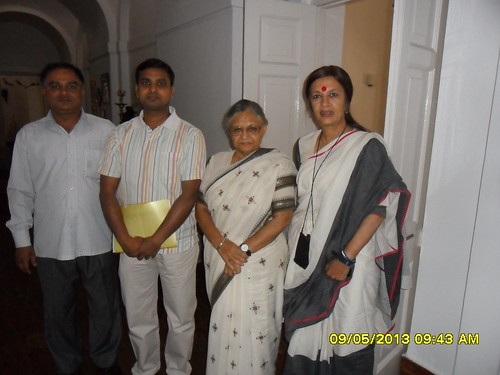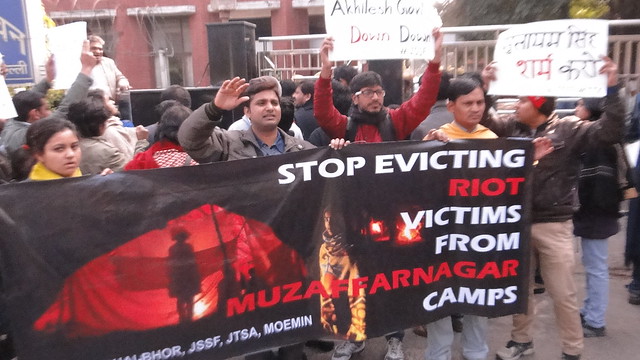By TwoCircles.net Staff Reporter,
New Delhi: The National Human Rights Commission (NHRC) has issued a show cause notice to the Delhi Government on Friday asking why monetary relief of Rs 5 lakh should not be recommended to be paid to Mohammad Amir, who was released in January 2012, after 14 year long incarceration in jail.
Amir was arrested on 27th February, 1998 from Old Delhi as an alleged ‘terrorist’ when he had just turned 18. NHRC called Amir a “victim” whose youth was destroyed due to “wrongful confinement for 14 years as a terrorist”. He has been acquitted in 17 cases, including one by the High Court of Delhi.
NHRC has given six weeks to the Chief Secretary, Government of NCT of Delhi to respond.

File Photo of Md. Amir Khan with Delhi CM Sheila Dikshit and Brinda Karat.
“Our Constitution accords the responsibility on the State to Protect and Promote Human Rights of individuals and the responsibility is based on good governance. Police play significant role in maintaining the order and enforce laws fairly and not unjustly. Police, as protector of law have both legal and moral obligations to uphold Human Rights and act strictly in accordance with law implicating innocent persons would not go only against all cannons of justice and rule of law but it would also amount to real accused escape from the clutches of law.”
Speaking to TwoCircles.net, Amir said, “No amount can bring back what I have lost in those 14 years, including my father. The amount NHRC has mentioned is too small, but I am glad that they have once again set the ball rolling by issuing show cause to the Delhi Government.” He says that he will continue his struggle for justice.
Aamir, who is currently going through financial difficulties, added, “I am hopeful that the Aam Aadmi Party Government will take positive steps towards persons like me who were wrongfully confined for years and offer not just compensation, but some employment opportunity as well.”
Amanatullah Khan, the AAP MLA from Okhla who raised the issue of Amir and witch hunting of Muslim youth in the name of counter-terrorism operation in the Delhi Assembly told TwoCircles.net, “Rs 5 lakh is a small amount and can do little to help Amir but the step taken by NHRC should be welcomed.” He added that the government should also take the matter seriously and offer Amir a job, assuring that he will do all in his capacity to see that he gets adequate compensation.
While acknowledging that national security is very critical, NHRC has held that an essential principle of Rule of Law is that every executive action if it is to operate to the prejudices of any person must have authority of law to support it. Within the parameters of such authority, rule of law must not become an instrument, which grossly violates the distinct human rights of the citizens.
Referring to Amir’s case, the NHRC noted, “It transpires from the case record that the victim was subjected to State action only on suspicion. Not an iota of evidence was produced in the court to connect Mohammad Amir with any of the alleged crimes,” adding that the chronicle of allegations made against the victim only piled up over the years without any substance. “The material on record reflects the excesses committed by the concerned police authorities and also how he suffered incarceration silently. His conduct in the prison was found very satisfactory and praiseworthy by the Jailor of District Jail, Ghaziabad. All the newspaper reports were unanimous over the human rights violation of the victim and the Commission cannot afford to differ with the wisdom displayed by the courts and media.”
The NHRC had taken suo motu cognizance of the issue on the basis of the “distressing media report” carrying his story in March, 2014.
Hindi News Channel AajTak had broadcasted a documentary on him in its crime report –Vardaat – on “An innocent Muslim spends 14 years in prison.” The programmed was repeated on Monday as well.

Amir during a protest in Delhi.
Justice D. Murugesan, Member, NHRC in the notices issued to the Secretary, Union Ministry of Home Affairs and Delhi Police Commissioner, under case no 1361/30/9/2014, has asked them to submit detailed reports in the matter within four weeks. Further, the Delhi Police Commissioner was directed to submit entire record of the 12 cases filed against Amir along with his report.
Amir, along with a delegation led by Prakash Karat, he had met the President of India in November, 2012 and also then Chief Minister of Delhi, Sheila Dikshit, but all he got so far was assurances.
He had reiterated then that the long held demands of rights activists that there has been policy of even rehabilitating former terrorists if they shun violence in Punjab and North-Eastern states, why not then formulate some kind of policy for the rehabilitation of youth arrested wrongfully.
TwoCircles.net was the first news portal to break the sad story of Aamir. In August, 2010 Md. Ali of TCN (currently working with The Hindu) detailed the plight of Aamir and his family in an article 12 yrs in jail and counting: Story of Amir – a victim of war on terror , after he by chance briefly met Aamir in a Teeshazari Court in Delhi.
Md. Amir Khan, a resident of Azad Market in Old Delhi, was charged in 20 cases of bomb blasts in and around Delhi in 1998. He was barely 18 years old he was picked up on that fateful night of February 20, 1998. “It’s just impossible for me to describe the physical torture I was made to go through, after which I was threatened and forced to sign few papers, which I later got to know, were my confession statements,” he had told TCN after his acquittal.
TCN was again the first news-portal to break the story of his acquittal in January 2012 (War on terror: If you can’t find the terrorist, make oneand Amir Khan: 14 years in jail, acquitted but still scared of police witch-hunt). Almost all mainstream TV and print media later followed the story of Aamir.
The trial court had acquitted him in 17 cases on the ground that ‘there is absolutely no incriminating evidence against the accused.’ The Delhi High Court in one of the three cases that went into appeal observed ‘the prosecution has miserably failed to adduce any evidence to connect the accused appellant with the charges framed, much less prove them’. He was released in January 2012.
Leave a Reply